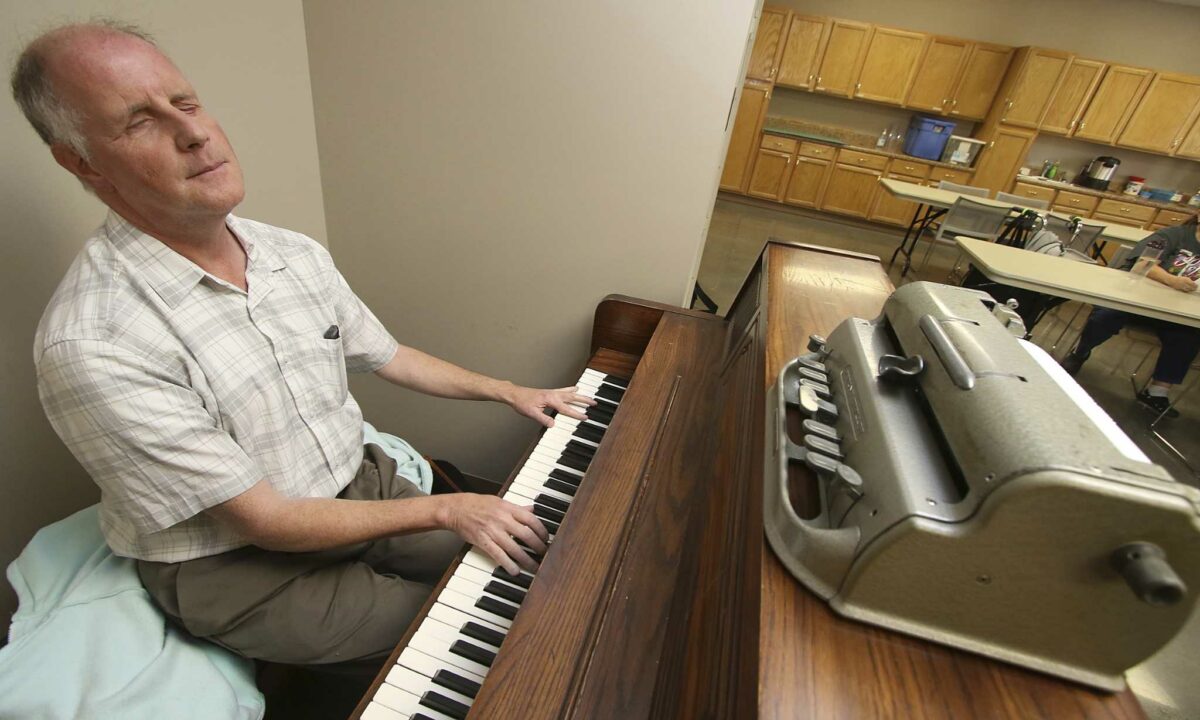
KINGS MOUNTAIN, N.C. (AP) — Dale Lieser believes in blooming where he’s planted.
He likes to say that you can find fertilizer wherever you are.
Blind since the age of 9, he trained as a classical pianist and uses his skills to encourage and uplift others.
Recently, a half dozen people gathered in the choir room at the H. Lawrence Patrick Senior Center and began running through a repertoire of songs for upcoming performances, including a Valentine’s Day program.
In the corner of the room at the piano, Lieser’s fingers fly over the keys, a joyous tune erupting from the instrument as the group sang “The Crawdad Song,” and then moved on to “She’ll be Coming Round the Mountain.”
One of the members said you have to meet two requirements in order to join, you have to laugh and you have to be a little crazy. But you don’t have to know how to sing.
“You don’t have to be able to sing,” Lieser said. “It’s not a qualification for this group.”
As the group throws out songs, Lieser types the titles on his Braille typewriter.
When the group is done practicing, Lieser says a prayer and they disperse.
Lieser, who has always been passionate about the piano, began playing at the age of 5 and started lessons at 9.
“It’s something I’ve always gravitated to,” he said. “I can’t quite express it. I just remember that it’s something that always came quite easily to me.”
He felt as if he were meant to play the piano.
When he became totally blind as a child, his parents made the decision to have him attend a residential school for the blind and one of his teachers insisted he learn to read Braille music, which he was initially reluctant to do, but it became a valuable tool when he began to play classical music, which can’t be learned by ear.
Born and raised in Minnesota, he left his home state in 1989.
He earned his bachelor’s degree from St. Olaf College in Minnesota and got his master’s degree from the University of Arkansas and got 95% through a doctoral degree from the University of Oklahoma. He said he did all the coursework, recitals and exams but just didn’t do his dissertation. He said he got behind on bills and decided to work instead.
Over the years, he has worked as a staff accompanist for the ballet department of the University of Oklahoma and then at a large choir at Oklahoma City for 12 years. He also taught music classes at a small Bible college.
Eventually, Lieser ended up in Kings Mountain and about a year ago, he discovered the Kings Mountain senior center and learned he was eligible to join. He got involved as much as he could and drifted into playing the piano for the choir.
He said the choir performs at various nursing and retirement homes within a one hour radius as well as at the center itself.
“It’s a delightful place,” he said. “It’s a very active place, very positive.”
Lieser also volunteers in the kitchen and helps load dishes in the dishwasher each week after the Friday lunch.
“It feels good to be involved,” he said.
He also spends his time playing the piano for his church, teaching private lessons and reading, which he said is his number one hobby.
He is able to use the digital files on his phone to listen to ebooks.
“I think of blindness as a nuisance,” he said. “We’re all handicapped in some way.”
Lieser has never let being blind stop him from living a full life and pursuing all his interests from competing – and winning – a fishing tournament for the blind, to going bowling, skiing and rock climbing.
“You don’t have to see to do all that,” he said.
He said his education at the residential school for the blind taught him the skills he needed to be independent and fully engaged in life.
Living with people who had visual impairments and being taught by teachers who knew how to work with the blind or who had impairments themselves, made a big impact on him.
“We were just never taught you shouldn’t or couldn’t do something,” he said.
He said he learned just as much outside the classroom as in it, such as making his bed, cleaning, going out to eat at restaurants and shopping.
“You learn how to do that. No reason not to,” he said.
He was thankful his parents had the foresight and courage to send him to a residential school.
Lieser also has a guide dog named Pepper.
His third guide dog, he said they’ve been together for two years, and she is the one who has bonded with him the best.
“Pepper is the best match I’ve had so far,” he said.
“When I’m walking, she helps me avoid obstacles,” he said.
When he’s in a parking lot and has no orientation, she’ll help him find the door.
But when Pepper is home, she’s just like any other pet dog and is not expected to work.
He also uses a cane to get around but said having Pepper gives him more confidence than just using a cane.
Lieser said he was born with cataracts and had them removed as an infant but then he developed glaucoma.
He had to have many surgeries after that but he had too much scar tissue and ultimately lost all of his vision.
He doesn’t feel sorry for himself though.
“There’s no reason to complain,” he said. “We all have things we wish we could change.”
He said one of his goals is to make others’ lives easier in whatever way he can and be a blessing to those around him.
“I’ve been given too much to keep it to myself,” he said.